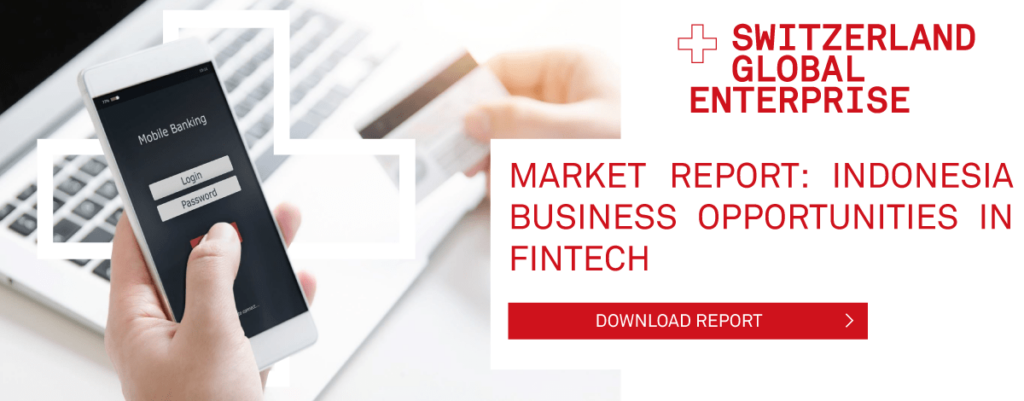
Booming Indonesian Digital Finance Sector to See Revenues Reach US$8.6B by 2025
by Fintech News Indonesia October 14, 2021Indonesia, the largest economy in Southeast Asia and the eighth largest in the world in terms of purchasing power parity, has become one of the fastest growing fintech markets in the region.
By 2025, digital financial services revenues in Indonesia is projected to rise to US$8.6 billion, growing at a compound annual growth rate (CAGR) of 34%, according to a new market report by Swiss export and promotion agency, Switzerland Global Enterprise.
Payments and alternative lending under the spotlight
Indonesia hosts around 20% of all fintech firms in the ASEAN region with lending and payments currently dominating the domestic fintech ecosystem, accounting for 61.4% and 19.3%% of firms respectively.
In the digital wallet space, leading players consist of some of the country’s biggest tech firms, telcos, as well as partnerships involving foreign companies looking to enter the domestic market. GoPay, for example, is the digital wallet of GoJek, an on-demand multi-service platform and a startup unicorn, and Ovo is another popular digital wallet service developed by local conglomerate Lippo Group. Together, they account for more than 55% of all digital payments in the country, according to a Digital Banking report by the Jakarta Post.
In addition to GoPay and Ovo, there are also DANA, which is backed by China’s fintech giant Ant Financial and local media conglomerate Elang Mahkota Teknologi, as well as LinkAja, a service owned by a consortium of state-owned firms.
Between 2017 and 2019, e-money transaction volumes increased by a staggering 11.8 times to reach IDR 145 trillion (US$9.8 billion), the Switzerland Global Enterprise report says. One reason behind Indonesia’s surging digital payments industry is the country’s booming e-commerce market which is projected to reach US$26.9 billion by 2020 and cross US$50 million by 2024, it notes.
In the alternative financing space, official figures from the Indonesia Financial Services Authority (Otoritas Jasa Keuangan, or OJK) estimate that there were over 1,000 active peer-to-peer (P2P) lenders in 2019. However, only around 160 of them were considered legitimate businesses and a mere 25 had actually been granted licensed by the OJK as of late-2019.
Indonesia’s well developed alternative funding space can be in part explained by the country’s still largely underserved traditional credit market, which has left a gap for new, innovative startup companies to fill.
So far, these have gained notable traction from the public, with P2P lending volumes growing from a cumulative IDR 2.56 trillion (US$173 million) in loans disbursed as of December 2017 to IDR 95.4 trillion (US$6.4 billion) as of February 2020, a growth of 37.3 times, according to the Switzerland Global Enterprise study.

Fintech lending statistics in Indonesia, Market Report: Indonesia, Business Opportunities in Fintech, Switzerland Global Enterprise, Source: Otoritas Jasa Keuangan (OJK)
According to estimates from Fintech News Singapore, there are now some 243 fintech startups in Indonesia. Besides P2P lending and payments, other segments present include personal finance, insurtech and blockchain.
But it’s not just fintech startups and tech firms that have been pursuing the Indonesian fintech opportunity. Traditional banks themselves have adopted varied digital strategies with hopes to both remain relevant and tap into the large population of unbanked.
The Switzerland Global Enterprise report notes that larger institutions such as Bank Madiri have set up their own fintech-focused venture capital funds, and are now actively embracing APIs. Bank Bukopin, which focuses on small and medium-sized enterprises (SMEs), formed a fintech incubator called BnV Labs back in 2017. BRI, the country’s largest micro-lender, has tied up with fintech companies to create an additional channel for financing SMEs.
Looking ahead
In Indonesia, businesses and consumers alike are rapidly warming up to fintech solutions. In 2019, McKinsey estimated that between 2014 and 2017, digital banking penetration had increased by 1.6 times. In 2017, 58% of banking consumers used digital channels, compared to only 36% in 2014, the study says.
And with COVID-19 substantially transforming the way people transact and manage their finances, fintech is expected to see further growth. Since the pandemic began, local banks have reported an unprecedented surge in digital services and an increase in the registration of digital banking accounts. Indonesia’s state-owned Bank Rakyat Indonesia saw a 10% month-on-month increase on its mobile banking channels alone, and online lenders are seeing a significant rise in demand, reports the Jakarta Post.
THE TEAM AND CONTACT DETAILS
Switzerland Global Enterprise | Headquarters
Stampfenbachstrasse 85 | CH-8006 Zurich | T +41 44 365 51 51 | s-ge.com
 ANGELA DI ROSA
ANGELA DI ROSA
Senior Consultant South East Asia
adirosa@s-ge.com
T +41 44 365 54 73
M + 41 79 680 08 44
 ALAIN GRAF
ALAIN GRAF
Senior Consultant Asia
S-GE Renens office
agraf@s-ge.com
T +41 21 545 94 97
M + 41 79 634 2057
 MONICA ZURFLUH
MONICA ZURFLUH
Head S-GE Southern Switzerland
mzurfluh@s-ge.com
T +41 91 601 86 85
M +41 79 220 40 71
Swiss Business Hub Indonesia
c/o Embassy of Switzerland | Jl. H.R. Rasuna Said | Blok X 3/2 | Kuningan | Jakarta 12950 | Indonesia
 WOLFGANG SCHANZENBACH
WOLFGANG SCHANZENBACH
Head Swiss Business Hub Indonesia
wolfgang.schanzenbach@eda.admin.ch
T +41 58 480 38 55
M +62 811 870 9013
 FERANICA SUSANTO
FERANICA SUSANTO
Senior Trade Officer
feranica.susanto@eda.admin.ch
T +41 58485 0466
M +62 812 953 7355
Featured image credit: Edi Kurniawan on Unsplash








